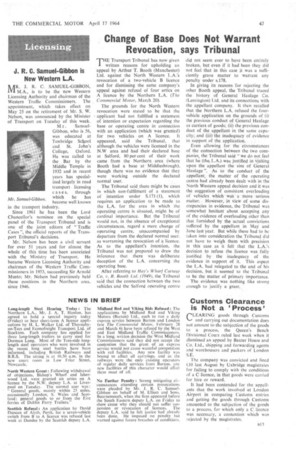Change of Base Does Not Warrant Revocation, says Tribunal
Page 49

If you've noticed an error in this article please click here to report it so we can fix it.
THE Transport Tribunal has now given written reasons for upholding an appeal by Arthur T. Booth (Manchester) Ltd. against the North Western L.A.'s revocation of a two-vehicle B licence and for dismissing the same company's appeal against refusal of four artics on A licence by the Northern L.A. (The Commercial Motor, March 20).
The grounds for the North Western revocation were stated to be that the applicant had not fulfilled a statement of intention or expectation regarding the base or operating centre in connection with an application (which was granted) for two vehicles on A licence. It appeared, said the Tribunal, that although the vehicles were licensed in the N.W area and had their declared base at Salford, 80 per cent of their work came from the Northern area (where Booth had a base at Middlesbrough), though there was• no evidence that they were working outside the declared normal user.
The Tribunal said there might be cases in which non-fulfilment of a statement of intention under 5.171(1), which requires an application to be made to the L.A. for the area in which the operating centre is situated, might be of cardinal importance. But the Tribunal would not, in the absence of exceptional circumstances, regard a mere change of operating centre, unaccompanied by departure from the declared normal user, as warranting the revocation of a licence. As to the appellant's intention, the Tribunal was not prepared to draw the inference that there was deliberate deception of the L.A. concerning the operating base.
After referring to Hay's Wharf Cartaqe Co. v. B. Booth Ltd. (1949), the Tribunal said that the connection between the two vehicles and the Salford operating centre
did not seem ever to have been entirely broken, but even if it had been they did not feel that in this case it was a sufficiently grave matter to warrant any penalty under s.178.
In giving its reasons for rejecting the other Booth appeal, the Tribunal traced the history of General Haulage Co. (Lemington) Ltd. and its connections with the appellant company. It then recalled that the Northern L.A. refused the fourvehicle application on the grounds of (i) the previous conduct of General Haulage as carriers of goods; (ii) the previous conduct of the appellant in the same capacity; and (iii) the inadequacy of evidence in support of the application.
Even allowing for the circumstances of the connection between the two companies, the Tribunal said" we do not feel that he (the L.A.). was justified in visiting upon the appellant the sins of General Haulage ". As to the conduct of the appellant, the matter of the operating centre had already been dealt with in the North Western appeal decision and it was the suggestion of consistent overloading of vehicles which was a more serious matter. However, in view of some discrepancies in evidence, the Tribunal was somewhat hesitant about accepting any or the evidence of overloading other than that furnished by the actual convictions suffered by the appellant in May and June last year. But while these had to be taken into consideration the Tribunal did not have to weigh them with precision in this case as it felt that the L.A.'s decision to refuse the licence was fully justified by the inadequacy of the evidence in support of it. This aspect the L.A. had relegated to the end of his decision, but it seemed to the Tribunal io be the matter of primary importance.
The evidence was nothing like strong enough to justify a grant.




































































































































